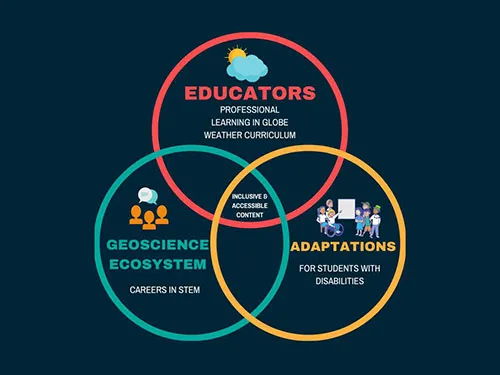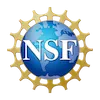GLOBE Weather Pathways for Students with Disabilities Project Summary
Overview

The goal of "GLOBE Weather Pathways for Students with Disabilities" is to develop and test an approach to provide middle school educators with the experiences, tools and abilities to adapt geoscience curricular resources to meet the needs of students with disabilities and articulate career pathways and opportunities in STEM for them. GLOBE Weather Pathways will consist of three interrelated components: 1) establishment and support of a geoscience learning ecosystem consisting of local STEM educators, content specialists (atmospheric sciences), special educators and person(s) with a disability working in STEM fields to support student career pathways; 2) professional learning (PL) on the GLOBE Weather curriculum, an NGSS based unit in which students engage with weather concepts through a phenomena-based approach, and; 3) Exceptional Needs Workshops where participants will work to adapt materials for middle school students with physical disabilities.
Intellectual Merit
The research team will work together with evaluators to develop and study the GLOBE Weather Pathways approach based on the three interrelated project elements listed above. Although many programs have been designed to address increasing enrollment of students with disabilities into science, technology, engineering and mathematics (STEM) in college (DO-IT, 2006), relatively few programs have addressed the need for teachers of science to work strategically with students with disabilities in their classrooms. While the GLOBE Weather unit has shown promising results with general education teachers, there has been little or no research on how to develop adaptations for students with disabilities using an NGSS-driven storyline unit of instruction. This project will help to address this gap by fully understanding how this approach can be used by educators in a learning ecosystem over the course of three years. The project provides the opportunity for science teachers to work directly with STEM professionals in adaptations of a unit including career opportunities.
Broader Impacts
The audience for this research - middle school students with disabilities - represents an important and understudied population in the geosciences. Overall, 14.4 million, or 9%, of the 25- to 64-year-old population reported at least one type of disability in 2015 (NCES, 2015). The participation of persons with disabilities as STEM professionals is low and STEM professionals with disabilities make up much less than 10% of all employed professional scientists and engineers (NCSES, 2019), and those with significant disabilities are likely to be below 5% (NCSES, 2019 tab 9-40). By increasing access to STEM fields for students and audiences with disabilities and by improving the quality of resources available in these disciplines, more persons with disabilities may consider pursuing STEM careers. A challenge for many science educators is how to help middle school students envision geoscience concepts and a broader range of STEM career opportunities. This project will address this challenge by developing, studying, and disseminating the three components so that educators can better meet the individual learning needs of their students within local contexts and prepare middle school students for future STEM careers. This project will directly impact at least 3,780 students over the three years of the project, and indirectly impact thousands more through peer and family connections. GLOBE Weather Pathways will enhance the abilities of education organizations with an approach to adapt resources for students with disabilities providing potential insight from a population that would have otherwise not been included.
Summer Workshop Description
The University Corporation for Atmospheric Research (UCAR), Center for Science Education (SciEd), along with faculty from Pennsylvania Western University, and the College of Charleston (South Carolina), will host a cohort of middle school educators for three-day workshops over three consecutive summers: in Boulder, Colorado (June 2023); in Erie, Pennsylvania (June 2024); and in Charleston, SC (June 2025). Our three year educator cohort, along with one-year educators recruited from each workshop location, will participate by adapting lessons from the GLOBE Weather curriculum.
The workshop has three components: Educators will 1) participate in professional learning in the GLOBE Weather curriculum, 2) adapt lessons from the GLOBE Weather curriculum to meet the needs of their students with disabilities, and 3) learn about careers in STEM/Geosciences. Each workshop will focus on providing middle school educators (i.e., both science teachers and special education professionals) with the experiences, tools, and connections with the broader community of science related informal education, and abilities to adapt geoscience curricular resources to meet the needs of students with physical disabilities and articulate career pathways and opportunities in STEM for students with disabilities.
Questions?
Becca Hatheway
Director, UCAR Center for Science Education
hatheway@ucar.edu
Dr. David Hurd
Pennsylvania Western University
dhurd@pennwest.edu
Dr. Cass Runyon
College of Charleston
RunyonC@cofc.edu

GLOBE Weather Pathways is based on the work supported by the National Science Foundation (NSF) under Grant # 2229351. Any opinions, findings, or conclusions expressed in this material are those of the authors and do not necessarily reflect the views of the National Science Foundation.
